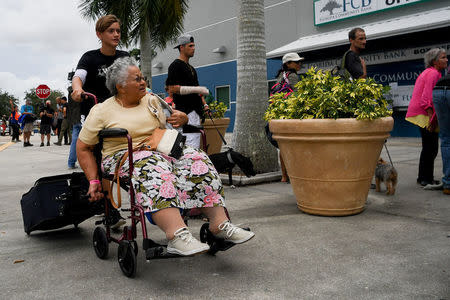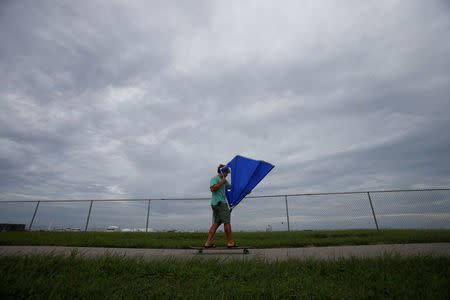To flee or stay? Irma's shifting path forces some to reconsider
By Andy Sullivan and Steve Nesius MIAMI/TAMPA, Fla. (Reuters) - Walter Hodgdon scrapped plans to ride out Hurricane Irma on Saturday when shifting forecast models suddenly put his home on a barrier island on Florida's Gulf Coast directly in its path. Within hours, Hodgdon and his partner had hastily boarded up their home and were driving to North Carolina, having the time to store just a few valuable glasswares in an inner closet. "Last night, during one of the models, they drew a line right over our house," said Hodgdon, 58, who lives on Terra Ceia where Tampa Bay meets the Gulf of Mexico. "We figured if we are going to leave, we are going to leave completely." Hodgdon and his partner, Nels Gullerud, were among the scores of people living on Florida's west coast forced to make last-minute decisions about whether to hunker down - or flee - amid one of the fiercest Atlantic storms in a century. Storm models that earlier in the week projected Irma to bear most heavily on eastern Florida now had the storm barreling right up the western coastline, menacing population hubs around Tampa and Fort Myers. "People haven't known exactly what to do, because the situation changes every 12 hours," said Adam Gray, pastor of Redeeming Church in St. Petersburg, Florida, who two days ago week talked to relatives on the east coast about staying with him. Now his wife and young child had evacuated, while he stayed behind to help church members board up their houses and locate spare rooms on higher ground. He planned to open the church to those unable to find shelter. Others in Irma's path decided to take their chances. As surrounding neighborhoods evacuated, Andrea Prather of Fort Myers stocked up on bottled water and food to ride out the storm with her boyfriend and her cat. The 51-year-old pop singer felt safe on the 25th floor of a high-rise built to withstand hurricane-force winds. Still, as the most recent hurricane models showed the storm heading her way, her jitters flared. "When it made that turn, that's when I had that anxiety pit in my stomach," she said. "How can anyone be totally prepared?" Michael Albrecht, a communications professor at Eckerd College in St. Petersburg, decided to stay at his parents' fourth-floor condo in South Pasadena, near the Gulf of Mexico. He decided he would be safer in the concrete building with aluminum storm shutters, high above any storm surge, than at his own one-story house in nearby Gulfport, on a street prone to flooding and surrounded by tall trees that could fall down. "No branches can hit you up here on the fourth floor," said Albrecht, 40. "I'm worried about what if it's a week without air conditioning and electricity. That'll be inconvenient but not life-threatening." But after a week of making and changing evacuation plans, Dionna Duncan, 48, on Saturday morning simply opted to leave her home in Palm Harbor, Florida. She had been working all week, without time to prepare. Plywood and other supplies were sold out. She could only put out a few sandbags. She remembered to take 200-year-old family pictures. But she left hanging in her closet the wedding veil that her daughters had wanted to wear someday. "You just forget, because you are in such a hurry," said Duncan, who works in the insurance industry and had for years made detailed disaster plans. "When you are staring something like this in the face, it doesn't matter what your experience is. Most of your knowledge just escapes you." Retiree Ann Pinsker, 71, and her husband chose to evacuate from their Fort Lauderdale condo on Florida's east coast on Thursday when they thought the storm was headed that way. After a 3-1/2-hour drive stretched into 9-1/2 hours, they now fear the storm is headed directly at the hotel where they are staying in Lakeland, in the central part of the state. With Fort Lauderdale now predicted to be spared the brunt of the storm, their neighbors are sending them photographs from a "hurricane party" they are holding in the building. "I wish we were there," Pinsker said. "But hindsight is 20-20." (Writing and additional reporting by Letitia Stein in Detroit and Diane Craft in New York; Editing by Frank McGurty and Jonathan Oatis)





